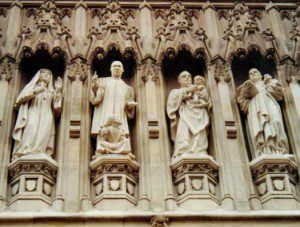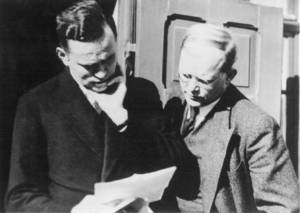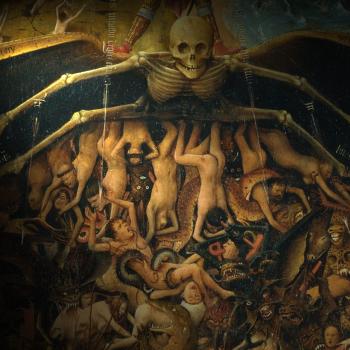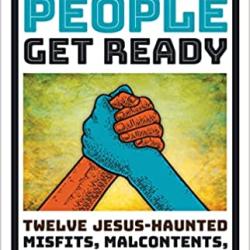In the 1970s, Latter-day Saint leaders began to quote C.S. Lewis in the semi-annual General Conference talks.

Earlier this month, Mormon Apostle D. Todd Cristofferson made a rather striking reference to the German theologian Dietrich Bonhoeffer in a discussion of marriage. Cristofferson quoted at length from a May 19, 1943 sermon that Bonhoeffer wrote while incarcerated in a high-security Gestapo prison:
Marriage is more than your love for each other. … In your love you see only your two selves in the world, but in marriage you are a link in the chain of the generations, which God causes to come and to pass away to his glory, and calls into his kingdom. In your love you see only the heaven of your own happiness, but in marriage you are placed at a post of responsibility towards the world and mankind. Your love is your own private possession, but marriage is more than something personal—it is a status, an office. Just as it is the crown, and not merely the will to rule, that makes the king, so it is marriage, and not merely your love for each other, that joins you together in the sight of God and man. … So love comes from you, but marriage from above, from God.
What a beautiful message. One can readily see why Cristofferson appropriated it for his discussion of the significance of marriage for Latter-day Saints. For Mormons, marriage a divine institution, an ordinance connected with with the exaltation of men and women to become kings and queens unto God. Marriage is the crowning ordinance that exalts human beings back into the presence of a Father they had once known prior to their mortality. It binds together the generations.
As one would expect, there are many things in Bonhoeffer’s understanding of marriage that do not accord with Cristofferson’s. Most obviously, for Bonhoeffer, it is marriage until death, probably not eternity. Nor does Bonhoeffer connect marriage with salvation or exaltation.
Of course, Bonhoeffer is an interesting vehicle for this message. Cristofferson cites the document as a letter from Bonhoeffer to his niece (Renate Schleicher). More accurately, it a sermon that Bonhoeffer wrote for Eberhard Bethge and Renate Schleicher which he would have delivered while marrying them if not in prison.

More fully, it is worth noting that the marriage between Bethge and his niece was a bittersweet matter for Bonhoeffer. It was Bethge who was the love of Bonhoeffer’s life. As I wrote in a review of Charles Marsh’s Strange Glory: “Bonhoeffer and Bethge lived together for some time, shared a bank account, and sent joint Christmas gifts to family members and friends. Their relationship was unbalanced. Bonhoeffer consistently demanded more from Bethge than the latter gave: more attention, more letters, and more visits.” Two months after Bethge became engaged to his seventeen-year-old niece, Bonhoeffer proposed to eighteen-year-old Maria von Wedemeyer. The pastor and theologian had never previously had a girlfriend. Even so, he had trouble letting go of Bethge, whom he wrote letters speculating about future trips they might take together, without their wives. Marsh describes how with Bethge, Bonhoeffer “strained toward the achievement of a romantic love, one ever chaste but complete in its complex aspirations.”
None of this has all that much to do with the content of Bonhoeffer’s wedding sermon. Its words are beautiful. Bonhoeffer’s attachment to Bethge, though, coupled with the somewhat strange circumstances of his engagement to Wedemeyer, make him an unusual source of marital wisdom for Latter-day Saints.
Everyone wants a piece of Dietrich Bonhoeffer, it seems. Evangelicals like Bonhoeffer in part because of his trenchant critiques of the regnant liberal Protestant theology of his time. Liberal Protestants like Bonhoeffer in part because of his searching questions and his ruthless demotion of national idols. Everyone appropriates Bonhoeffer as a brave martyr. Even if his role in the conspiracy to assassinate Hitler was minor, Bonhoeffer from the start was a rare voice of clear opposition to the German Christian movement within what was now the “Reich Church.” Bonhoeffer insisted that those who refused to worship with Christians of Jewish descent by their actions separated themselves from the true church of Jesus Christ.
I very much like the fact that Mormon leaders are introducing their members to C.S. Lewis and Dietrich Bonhoeffer, and I hope that Bonhoeffer’s relationship with Bethge will not give them pause. If Bonhoeffer’s sermon for his beloved friend is moving merely in its words, the context of their friendship makes it a far more poignant example of self-sacrificial love.












